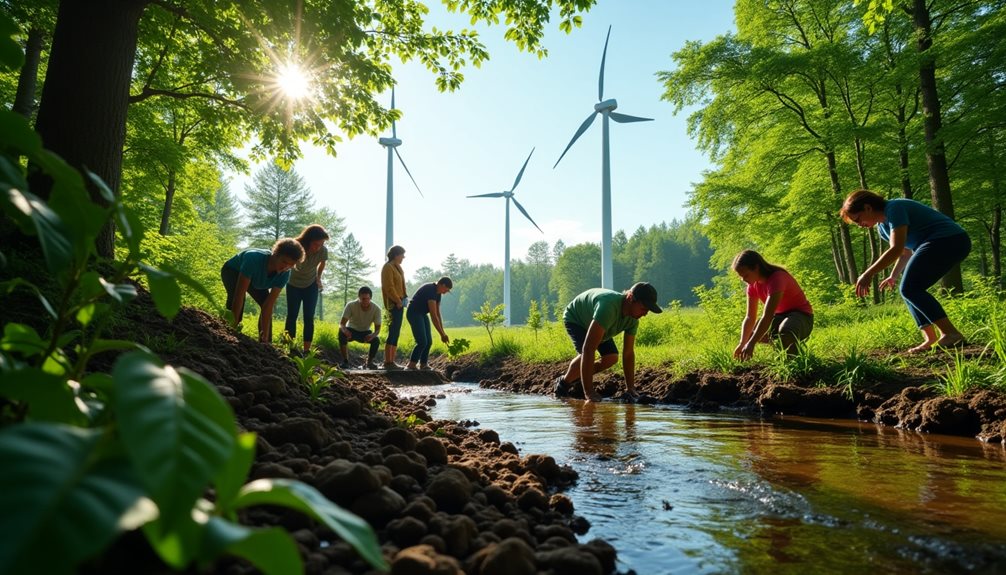Table of Contents
ToggleUnderstanding Climate Change: Основные термины

Understanding climate change requires knowing the main terms that shape our conversations about the environment. The Russian term “глобальное потепление” (glo-BAHL-nuh-ye pa-tee-PLEH-nee-ye), which translates to “global warming,” means the long-term rise in the Earth’s average surface temperature. This increase is mainly caused by human activities, especially burning fossil fuels like coal, oil, and gas, as well as large-scale deforestation. These actions release greenhouse gases, such as carbon dioxide (CO₂) and methane (CH₄), into the atmosphere. These gases trap heat from the sun, causing the planet to warm over time.
“Климатические изменения” (klee-mah-TEE-chee-skee-ye iz-me-NYE-nee-ya), or “climate change,” is a broader term. It refers not only to rising temperatures but also to changes in weather patterns, more frequent and severe storms, melting glaciers and ice caps, rising sea levels, and shifts in plant and animal habitats. Climate change affects agriculture, water resources, and even human health, leading to new challenges for communities around the world.
For anyone who values independence and making informed choices, understanding these terms is crucial. When people know what global warming and climate change really mean, they are better prepared to recognize their effects in daily life—such as longer heatwaves, unusual storms, or reduced crop yields. This knowledge helps individuals and communities make smarter decisions about energy use, transportation, and supporting policies or technologies that reduce environmental harm.
The importance of climate literacy is growing as the consequences of inaction become more serious. People who understand these scientific concepts are better equipped to advocate for solutions: reducing energy consumption, using renewable sources like solar or wind power, conserving forests, and supporting sustainable agriculture. In short, learning about global warming and climate change gives people the tools they need to help protect our planet for future generations.
![]()
Key Concepts in Sustainability: Устойчивое развитие
Sustainability, or “устойчивое развитие,” serves as a guiding principle for addressing the intricate relationship between human activities and the environment. It emphasizes the need for a balanced approach that fosters both ecological integrity and social equity. The integration of these concepts is essential for fostering a harmonious coexistence with nature.
| English | Russian (Cyrillic + Phonetic) | Meaning |
|---|---|---|
| Sustainability | Устойчивое развитие (ustoichivoye razvitie) | Meeting current needs without harming future generations. |
| Sustainable consumption | Устойчивое потребление (ustoichivoye potrebleniye) | Using resources in a way that preserves them for the future. |
| Social responsibility | Социальная ответственность (sotsial’naya otvetstvennost’) | Acting ethically to benefit society and share resources fairly. |
| Ecological sustainability | Экологическая устойчивость (ekologicheskaya ustoichivost’) | Keeping nature healthy and able to recover from human impact. |
| Economic development | Экономическое развитие (ekonomicheskoye razvitie) | Growth that helps everyone and protects the environment. |
| Resource efficiency | Эффективное использование ресурсов (effektivnoye ispol’zovaniye resursov) | Using materials, energy, and water wisely with less waste. |
| Environmental protection | Защита окружающей среды (zashchita okruzhayushchey sredy) | Actions to keep air, water, and land clean and safe for all living things. |
| Intergenerational equity | Межпоколенческое равенство (mezhpokolencheskoye ravenstvo) | Fairness in sharing resources between today’s and future generations. |
| Renewable resources | Возобновляемые ресурсы (vozobnovlyaemye resursy) | Natural materials that can be replaced naturally, like solar energy or trees. |
| Biodiversity conservation | Сохранение биоразнообразия (sokhraneniye bioraznoobraziya) | Protecting the variety of life forms on Earth. |
| Climate action | Борьба с изменением климата (bor’ba s izmeneniyem klimata) | Efforts to reduce the effects of climate change and global warming. |
Environmental Initiatives: Экологические инициативы
Environmental initiatives are important actions or projects aimed at improving and protecting our environment. In Russian, they are called экологические инициативы (eh-kah-luh-gee-CHEE-skee-ye ee-nee-tsee-ah-TEE-vy). These initiatives can include many different projects that help reduce pollution, save resources, and protect nature.
Here is a table with useful Russian terms related to environmental initiatives.
| Russian (Cyrillic) | Phonetic (English letters) | English Definition |
|---|---|---|
| окружающая среда | ok-roo-ZHA-yu-shcha-ya sre-DA | environment |
| загрязнение | zag-ryaz-NYE-ni-ye | pollution |
| выбросы | VYB-ro-sy | emissions |
| возобновляемая энергия | va-zob-nov-LYA-yem-a-ya e-NER-gi-ya | renewable energy |
| энергосбережение | e-NER-go-sbe-re-ZHE-ni-ye | energy saving |
| переработка | pe-ra-ra-BOT-ka | recycling |
| природные ресурсы | pri-ROD-ny-e re-SOOR-sy | natural resources |
| устойчивое развитие | oos-TOY-chee-voye raz-VI-ti-ye | sustainable development |
| защита окружающей среды | za-SHEE-ta ok-roo-ZHA-yu-shchey sre-DY | environmental protection |
| отходы | ot-KHO-dy | waste |
| климатические изменения | kli-ma-TI-che-ski-e iz-me-NYE-ni-ya | climate change |
Through collaborative efforts, environmental initiatives can lead to a healthier planet, ultimately benefiting all living beings.
Renewable Energy: Возобновляемая энергия
Renewable energy (in Russian: возобновляемая энергия, pronounced va-zuhb-nah-vlya-ye-ma-ya eh-ner-gee-ya) is a key element in fighting climate change and moving toward sustainable sources of energy. This type of energy uses natural resources that are constantly replenished.
Main Types of Renewable Energy
1. Solar Energy (Солнечная энергия)
- Solar panels (солнечные панели) absorb sunlight and convert it into electricity.
- Example: В деревне установили солнечные панели.
(V derevne ustanovili solnechnyye paneli.) — Solar panels were installed in the village.
2. Wind Energy (Ветровая энергия)
- Wind turbines (ветровые турбины) use wind to produce power.
- Example: Ветровые турбины стоят вдоль побережья.
(Vetrovyye turbiny stoyat vdol’ poberezh’ya.) — Wind turbines stand along the coast.
3. Geothermal Energy (Геотермальная энергия)
- Uses underground heat for heating or generating electricity.
- Example: Геотермальная станция обеспечивает город теплом.
(Geotermal’naya stantsiya obespechivayet gorod teplom.) — The geothermal plant provides heat for the city.
4. Biomass (Биомасса)
- Uses organic materials like plants or agricultural waste.
- Example: Биомасса может использоваться для производства топлива.
(Biomassa mozhet ispol’zovat’sya dlya proizvodstva topliva.) — Biomass can be used for fuel production.
Why Renewable Energy Matters
- Reduces greenhouse gas emissions (снижает выбросы парниковых газов)
- Lowers air pollution (уменьшает загрязнение воздуха)
- Helps create jobs (создаёт рабочие места)
- Makes countries less dependent on imported fuels (уменьшает зависимость от импорта топлива)
Related Russian Terms Table
| Russian (Cyrillic) | English Phonetic | English Definition |
|---|---|---|
| возобновляемая энергия | va-zuhb-nah-vlya-ye-ma-ya eh-ner-gee-ya | renewable energy |
| солнечная энергия | sol-nech-na-ya eh-ner-gee-ya | solar energy |
| солнечные панели | sol-nech-ny-ye pa-nel-i | solar panels |
| ветровая энергия | vet-ro-va-ya eh-ner-gee-ya | wind energy |
| ветровая турбина | vet-ro-va-ya tur-bee-na | wind turbine |
| геотермальная энергия | geo-ter-mal-na-ya eh-ner-gee-ya | geothermal energy |
| геотермальная станция | geo-ter-mal-na-ya stan-tsi-ya | geothermal plant |
| биомасса | bee-o-mas-sa | biomass |
| органические материалы | ar-ga-neech-es-kie ma-teh-ri-a-li | organic materials |
| выбросы парниковых газов | vi-brosy par-ni-ko-vykh ga-zov | greenhouse gas emissions |
| загрязнение воздуха | zag-ryaz-ne-nie voz-du-kha | air pollution |
| топливо | top-li-vo | fuel |
| устойчивое развитие | us-toy-chiv-o-ye raz-vi-ti-ye | sustainable development |
| окружающая среда | ok-ru-zha-yu-shcha-ya sre-da | environment |
Learning these terms helps you discuss renewable energy confidently in Russian and understand news or articles on the subject.
Carbon Footprint: Углеродный след
A carbon footprint (углеродный след, [oo-gle-rohd-nyi sled]) is an important measure of how human activity affects the climate. This term describes the total amount of greenhouse gases (парниковые газы, [par-nee-ko-vye gah-zy]) produced as a result of human actions, including carbon dioxide (углекислый газ, [oog-leh-kees-lyi gaz]) and methane (метан, [meh-tan]).
Understanding your carbon footprint helps individuals and organizations create strategies for carbon offsetting (компенсация углерода, [kom-pen-sa-tsi-ya oo-gle-ro-da]). These strategies aim to reduce negative effects on the environment.
Examples of such strategies include:
- Using renewable energy sources (возобновляемые источники энергии, [vah-zob-nah-vlya-yem-ye ees-toch-ni-ki eh-ner-gi-i])
- Improving energy efficiency (энергоэффективность, [eh-ner-go-ef-fek-teev-nost’])
Taking these actions helps reach the goal of carbon neutrality (углеродная нейтральность, [oo-gle-rohd-na-ya ney-trahl’-nost’]).
For a sustainable future, it’s important for everyone to be aware of their carbon footprint and try to reduce it. By implementing these efforts, we not only protect the climate but also improve our quality of life. Ultimately, this supports our desire for freedom and responsibility to future generations.
Key Terms:
- Carbon footprint — углеродный след
- Greenhouse gases — парниковые газы
- Carbon dioxide — углекислый газ
- Methane — метан
- Carbon offsetting — компенсация углерода
- Renewable energy sources — возобновляемые источники энергии
- Energy efficiency — энергоэффективность
- Carbon neutrality — углеродная нейтральность
Biodiversity: Биологическое разнообразие

Biodiversity (биологическое разнообразие) is a fundamental component of ecosystems (экосистемы), playing a crucial role in maintaining their stability and functionality. The preservation of biodiversity is essential for the continued provision of ecosystem services (экосистемные услуги) that directly and indirectly impact human well-being.
Key Ecosystem Services Provided by Biodiversity
- Pollination of Plants (Опыление растений):
Many food crops depend on animals such as bees, butterflies, and birds for pollination. This natural process ensures the production of fruits, vegetables, and seeds, thus supporting food security (продовольственная безопасность) for millions of people worldwide. - Climate Regulation (Регуляция климата):
Diverse ecosystems like forests, wetlands, and oceans help regulate the Earth’s climate by absorbing carbon dioxide (двуокись углерода) and releasing oxygen (кислород). Healthy ecosystems act as natural buffers against the impacts of climate change (изменение климата), such as extreme weather events and rising temperatures. - Water Purification (Очищение воды):
Wetlands, forests, and healthy soils act as natural filters, removing pollutants from water sources and ensuring access to clean drinking water (чистая питьевая вода). Loss of biodiversity can disrupt these natural filtration systems, increasing the risk of waterborne diseases. - Ecosystem Health and Disease Regulation (Здоровье экосистем):
High biodiversity helps control the spread of pests (вредители) and diseases by maintaining a balance among species. Diverse communities are more resilient to invasions by harmful organisms and can recover more quickly from environmental stresses. - Provision of Raw Materials and Medicines (Сырье и лекарства):
Many materials we rely on—such as wood, fibers, and medicinal plants—are products of diverse biological systems. Numerous pharmaceuticals are derived from compounds found in wild species, making biodiversity conservation critical for future medical discoveries.
The Importance of Conservation
Protecting biodiversity requires active conservation efforts (меры по охране природы), including habitat protection, sustainable resource management, and the restoration of damaged ecosystems. Without such actions, the loss of species can undermine the long-term sustainability (устойчивость) of ecosystems and their ability to provide vital services to both people and nature.
Biodiversity is not just about preserving rare species; it underpins the health of our planet and the quality of life for present and future generations. By valuing and safeguarding biodiversity, we ensure resilient ecosystems capable of supporting human societies and the natural world alike.
Protecting the natural world is vital for the health of our planet. Conservation (охрана природы) involves actions and strategies to protect biodiversity (биоразнообразие), maintain ecosystem services, and ensure resources are available for future generations.
- Habitat Protection (охрана среды обитания): Preserving forests, rivers, and other habitats ensures that animals and plants have the space and conditions they need to survive. For example, protecting wetlands helps many species of birds and fish.
- Sustainable Resource Management (устойчивое управление ресурсами): Using resources like water, wood, or fish in a way that does not exhaust them. For instance, regulating fishing prevents overfishing and helps fish populations recover.
- Restoration of Damaged Ecosystems (восстановление повреждённых экосистем): Repairing areas that have been harmed by pollution or deforestation. Planting trees in cleared forests is one example.
Without conservation, the loss of species can damage ecosystems and reduce their ability to provide services such as clean air, water, food, and climate regulation.
Biodiversity and Human Well-being
Biodiversity is not only about saving rare or endangered species. It supports ecosystem resilience (устойчивость экосистем), which is essential for:
- Clean water and air
- Pollination of crops
- Natural disease control
- Climate stability
By protecting biodiversity, we support both nature and human communities.
Key Russian Terms on Conservation
| Russian (Cyrillic) | English Phonetic | English Definition |
|---|---|---|
| охрана природы | okhrana prirody | conservation, nature protection |
| биоразнообразие | bio-raznoobraziye | biodiversity |
| среда обитания | sreda obitaniya | habitat |
| устойчивость | ustoychivost’ | sustainability, resilience |
| восстановление | vosstanovleniye | restoration |
| управление ресурсами | upravleniye resursami | resource management |
| исчезающие виды | ischezayushchiye vidy | endangered species |
| экосистема | ekosistema | ecosystem |
| загрязнение | zagryazneniye | pollution |
| вымирание | vymiranie | extinction |
This list can help English speakers recognize and use key vocabulary when discussing conservation topics in Russian.
Climate Action: Климатические действия
Climate action (климатические действия) is an essential part of the global strategy to address climate change (изменение климата). These actions focus on reducing the carbon footprint (углеродный след), protecting ecosystems (экосистемы), and supporting sustainable development (устойчивое развитие). An important aspect of climate action is climate justice (климатическая справедливость), which emphasizes the need to ensure equal access to resources and protect the most vulnerable communities (сообщества). Communities play a key role in climate action initiatives, as they can actively participate in developing and implementing solutions tailored to their unique needs. Effective community engagement not only raises awareness about climate change but also creates sustainable behavior patterns needed to achieve environmental sustainability (экологическая устойчивость). This lays the foundation for a more just and sustainable future for all.
Waste Management: Управление отходами
Waste management (управление отходами) plays an important role in ensuring sustainable development and reducing negative impacts on the environment.
Effective waste management strategies (стратегии управления отходами) include:
- Development and implementation of recycling programs (программы переработки) to reduce the amount of waste going to landfill.
- Application of composting practices (практики компостирования) for the treatment of organic waste (органические отходы).
- Organization of educational campaigns (образовательные кампании) to raise public awareness about the importance of proper waste handling (правильное обращение с отходами).
- Collaboration with local businesses (сотрудничество с местными предприятиями) to create a closed-loop recycling system (замкнутый цикл переработки).
These measures not only help improve the environment (улучшение экологии), but also save resources (экономия ресурсов), supporting the goal of a free and sustainable lifestyle (устойчивый образ жизни).
Effective waste management is a key aspect in achieving environmental sustainability (экологическая устойчивость).
Green Technologies: Зеленые технологии
Green technologies are a key tool in the fight against climate change and in supporting sustainable development (устойчивое развитие).
These technologies include the latest green technology innovations (инновации в области зеленых технологий) aimed at minimizing negative environmental impact (негативное воздействие на окружающую среду). The use of sustainable design (устойчивый дизайн) makes it possible to create products and services that use resources efficiently and reduce waste (отходы).
Examples include solar panels (солнечные панели), energy-efficient buildings (энергоэффективные здания), and water management systems (системы управления водными ресурсами).
Green technologies (“зелёные технологии” [zy-LYO-ny-ye tekh-no-LO-gi-i]) are crucial for solving environmental problems and building a sustainable future. They focus on reducing harm to the environment, saving energy, and using resources wisely. Let’s expand on this topic and look at more Russian vocabulary related to green technologies.
How Green Technologies Help
Green technologies are used to:
- Lower pollution levels
- Decrease waste (“отходы” [at-KHO-dy])
- Conserve water and energy
- Use renewable resources, like solar or wind energy
- Encourage companies to create eco-friendly products
For example, “солнечные панели” (solar panels) turn sunlight into electricity. “Энергоэффективные здания” (energy-efficient buildings) use less energy for heating or cooling. “Системы управления водными ресурсами” (water management systems) help distribute water efficiently.
More Examples of Green Technologies
- Wind turbines (“ветряные турбины” [vet-rya-NY-e tur-BEE-ny])
- Electric cars (“электромобили” [e-lek-tro-mo-BEE-li])
- Recycling facilities (“заводы по переработке отходов” [za-VO-dy po pe-re-ra-BOT-ke at-KHO-dov])
- Energy-saving light bulbs (“энергосберегающие лампочки” [e-ner-go-sbe-re-GA-yu-shi-ye LAM-pach-ki])
- Biodegradable packaging (“биоразлагаемая упаковка” [bee-o-raz-la-GA-e-ma-ya oo-pa-KOV-ka])
Related Russian Terms
| Russian (Cyrillic) | English Phonetic | English Definition |
|---|---|---|
| зелёные технологии | zy-LYO-ny-ye tekh-no-LO-gi-i | green technologies |
| инновации | ee-nno-VA-tsii | innovations |
| устойчивое развитие | us-TOY-chiv-o-ye raz-VI-tee-ye | sustainable development |
| негативное воздействие | ne-ga-TIV-no-ye voz-DYEY-stvi-ye | negative impact |
| окружающая среда | ok-roo-ZHA-yu-shcha-ya sre-DA | environment |
| устойчивый дизайн | us-TOY-chiv-y DEE-zine | sustainable design |
| отходы | at-KHO-dy | waste |
| солнечные панели | SOL-nech-nye pa-NYE-li | solar panels |
| энергоэффективные здания | e-ner-go-eff-ek-TIV-ny-e zda-NI-ya | energy-efficient buildings |
| системы управления водными ресурсами | sis-TEM-y oop-ra-VLE-ni-ya VOD-nymi re-SOOR-sa-mi | water management systems |
| новые возможности для бизнеса | NO-vye voz-MOZH-nos-ti dlya BIZ-ne-sa | new business opportunities |
| экономический рост | ek-o-no-MI-che-ski rost | economic growth |
| экосистема | e-ko-SIS-te-ma | ecosystem |
| возобновляемая энергия | voz-ob-nov-LYA-e-ma-ya e-NER-gia | renewable energy |
| переработка | pe-re-ra-BOT-ka | recycling / processing |
These words and phrases will help you talk about green technologies in Russian with greater confidence.
Frequently Asked Questions
What Are the Main Causes of Climate Change?
The main causes of climate change include the burning of fossil fuels, which releases greenhouse gases, and widespread deforestation, reducing carbon absorption. These factors greatly contribute to global warming and environmental degradation, threatening future generations.
How Can Individuals Contribute to Sustainability Efforts?
Individuals can considerably contribute to sustainability efforts through personal actions, such as reducing waste and conserving energy, alongside community involvement in local initiatives. These combined efforts foster a collective responsibility towards a more sustainable future.
What Are the Impacts of Climate Change on Health?
Climate change greatly impacts health through increasing climate diseases, such as respiratory issues and heat-related conditions. These health effects disproportionately affect vulnerable populations, highlighting the urgent need for effective mitigation and adaptation strategies to protect public well-being.
How Do Government Policies Affect Environmental Initiatives?
Government policies greatly influence environmental initiatives through regulations that enforce compliance and policy incentives that promote sustainable practices. Such measures encourage businesses and individuals to adopt eco-friendly behaviors, ultimately fostering a culture of environmental responsibility.
What Role Do Businesses Play in Sustainability?
Businesses play an essential role in sustainability by embracing corporate responsibility and driving green innovation. Their commitment to environmentally friendly practices not only enhances brand reputation but also contributes considerably to long-term ecological balance and societal well-being.



